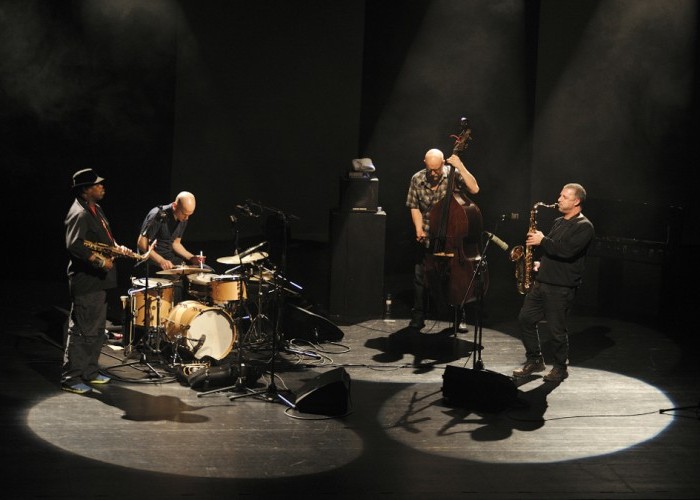Jan 13, 2026 2:09 PM
More Trump-Kennedy Center Cancellations
The fallout from the renaming of the John F. Kennedy Center for the Performing Arts to include President Donald…

Rodrigo Amado (right) recently issued History Of Nothing (Trost).
(Photo: Nuno Martins)Portuguese saxophonist Rodrigo Amado prides himself on the fact that all of the music made under his leadership has been fully improvised. In fact, a few years ago he convinced guitarist Luís Lopes to take over sole leadership of Humanization Quartet, because the band used written themes, and the saxophonist didn’t feel comfortable with the approach as something under his guidance. At the same time, the reedist’s music reveals impressive discipline and control. A History Of Nothing (Trost), a recent album in the company of three veteran American musicians—multi-instrumentalist Joe McPhee, bassist Kent Kessler and drummer Chris Corsano—bristles with energy and clarity, as the charged playing never supersedes a sense of proportion and thoughtful interaction.
Amado has been guided by an instinctual, autodidact framework since he got his first horn as a 17-year-old. He had severed his sciatic nerve when accidentally falling through a glass door, and his mother purchased him a horn to keep him occupied during a lengthy convalescence. Although he took a few rudimentary lessons to learn scales, he’s largely self-taught. And for a couple of years, he stuck to rock-driven improvisation with friends. But as he became more inspired by jazz—whether post-bop titans like Ornette Coleman or contemporary explorers like Mats Gustafsson—he began formal training at Lisbon’s Hot Clube de Portugal, a storied nightclub that began offering private lessons during the early ‘80s.
“The overall vibe toward young guys was that you had to study this particular way, to master bebop, before you can do anything else,” Amado said.
Although he took lessons with some of Portugal’s most important reedists, Amado did most of his learning at home from recordings. After about two decades of working in experimental circles, Amado had begun to tire of ad hoc improvised sessions.
In 2001, he was invited by Pedro Costa to help launch Clean Feed, a label considered by some to be one of the strongest and most adventurous imprints of the past decade. At the same time, he started the Lisbon Improvisation Players, a loose collective injected with his stylistic imprint. But Amado truly came into his own when he began organizing international ensembles, including a long-running trio with Kessler and Norwegian drummer Paal Nilssen-Love. He also formed his main working band, Motion Trio, with cellist Miguel Mira and drummer Gabriel Ferrandini, which has recorded on its own and with guest musicians, like trumpeter Peter Evans and trombonist Jeb Bishop.
“We have this strong thing with the trio, and if we record on our own it has a certain weight, but if we have a guest, we open up,” he said. “We really play the game with this new voice and we never know how it’s going to turn out. With Peter there was this panic—the first concert was like, ‘What the fuck is happening?’ He was fighting us and if Gabriel started to play some kind of groove, Peter would go against it—it was amazing. In terms of our playing, we grow a lot in that context—one concert can make you a different player.”
The rapport Amado has with McPhee, Kessler and Corsano grew from instincts, rather than regular meetings. “Putting those bands together is the most important decision. I’m always listening to stuff, and in an intuitive way, I try to figure out the personality of the musicians, which is kind of stupid. But I’ve never been wrong. I’ve played plenty of times with guys I first met on the afternoon flight, and we played a concert that same night, and I’ve never been deceived. Most of the time, the guys are exactly how I imagined they would be, even in personal terms. And I think that says a lot about what the music transmits about the musicians.” DB

Belá Fleck during an interview with Fredrika Whitfield on CNN.
Jan 13, 2026 2:09 PM
The fallout from the renaming of the John F. Kennedy Center for the Performing Arts to include President Donald…

Peplowski first came to prominence in legacy swing bands, including the final iteration of the Benny Goodman Orchestra, before beginning a solo career in the late 1980s.
Feb 3, 2026 12:10 AM
Ken Peplowski, a clarinetist and tenor saxophonist who straddled the worlds of traditional and modern jazz, died Feb. 2…

The success of Oregon’s first album, 1971’s Music Of Another Present Era, allowed Towner to establish a solo career.
Jan 19, 2026 5:02 PM
Ralph Towner, a guitarist and composer who blended multiple genres, including jazz — and throughout them all remained…

Rico’s Anti-Microbial Instrument Swab
Jan 19, 2026 2:48 PM
With this year’s NAMM Show right around the corner, we can look forward to plenty of new and innovative instruments…

Richie Beirach was particularly renowned for his approach to chromatic harmony, which he used to improvise reharmonizations of originals and standards.
Jan 27, 2026 11:19 AM
Richie Beirach, a pianist and composer who channeled a knowledge of modern classical music into his jazz practice,…